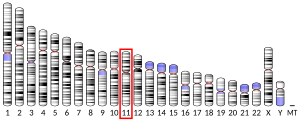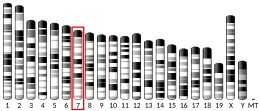7-Dehydrocholesterol reductase
7-Dehydrocholesterol reductase, also known as DHCR7, is a protein that in humans is encoded by the DHCR7 gene.[5][6][7]
Function
[edit]| 7-dehydrocholesterol reductase | |||||||||
|---|---|---|---|---|---|---|---|---|---|
| Identifiers | |||||||||
| EC no. | 1.3.1.21 | ||||||||
| CAS no. | 9080-21-1 | ||||||||
| Databases | |||||||||
| IntEnz | IntEnz view | ||||||||
| BRENDA | BRENDA entry | ||||||||
| ExPASy | NiceZyme view | ||||||||
| KEGG | KEGG entry | ||||||||
| MetaCyc | metabolic pathway | ||||||||
| PRIAM | profile | ||||||||
| PDB structures | RCSB PDB PDBe PDBsum | ||||||||
| Gene Ontology | AmiGO / QuickGO | ||||||||
| |||||||||
The protein encoded by this gene is an enzyme catalyzing the production of cholesterol from 7-dehydrocholesterol using NADPH.
The DHCR7 gene encodes delta-7-sterol reductase (EC 1.3.1.21), the ultimate enzyme of mammalian sterol biosynthesis that converts 7-dehydrocholesterol (7-DHC) to cholesterol. This enzyme removes the C(7-8) double bond introduced by the sterol delta8-delta7 isomerases. In addition, its role in drug-induced malformations is known: inhibitors of the last step of cholesterol biosynthesis such as AY9944 and BM15766 severely impair brain development.[5]
Pathology
[edit]A deficiency is associated with Smith–Lemli–Opitz syndrome.[8]
All house cats and dogs have higher-than-usual activity of this enzyme, causing an inability to synthesize vitamin D due to the lack of 7-dehydrocholesterol.[9]
Interactive pathway map
[edit]Click on genes, proteins and metabolites below to link to respective articles. [§ 1]
- ^ The interactive pathway map can be edited at WikiPathways: "VitaminDSynthesis_WP1531".
See also
[edit]References
[edit]- ^ a b c GRCh38: Ensembl release 89: ENSG00000172893 – Ensembl, May 2017
- ^ a b c GRCm38: Ensembl release 89: ENSMUSG00000058454 – Ensembl, May 2017
- ^ "Human PubMed Reference:". National Center for Biotechnology Information, U.S. National Library of Medicine.
- ^ "Mouse PubMed Reference:". National Center for Biotechnology Information, U.S. National Library of Medicine.
- ^ a b "Entrez Gene: DHCR7 7-dehydrocholesterol reductase".
- ^ Moebius FF, Fitzky BU, Lee JN, Paik YK, Glossmann H (Feb 1998). "Molecular cloning and expression of the human delta7-sterol reductase". Proceedings of the National Academy of Sciences of the United States of America. 95 (4): 1899–902. Bibcode:1998PNAS...95.1899M. doi:10.1073/pnas.95.4.1899. PMC 19210. PMID 9465114.
- ^ Wassif CA, Maslen C, Kachilele-Linjewile S, Lin D, Linck LM, Connor WE, Steiner RD, Porter FD (Jul 1998). "Mutations in the human sterol delta7-reductase gene at 11q12-13 cause Smith-Lemli-Opitz syndrome". American Journal of Human Genetics. 63 (1): 55–62. doi:10.1086/301936. PMC 1377256. PMID 9634533.
- ^ Yu H, Patel SB (Nov 2005). "Recent insights into the Smith-Lemli-Opitz syndrome". Clinical Genetics. 68 (5): 383–91. doi:10.1111/j.1399-0004.2005.00515.x. PMC 1350989. PMID 16207203.
- ^ Zafalon, Rafael V. A.; Risolia, Larissa W.; Pedrinelli, Vivian; Vendramini, Thiago H. A.; Rodrigues, Roberta B. A.; Amaral, Andressa R.; Kogika, Marcia M.; Brunetto, Marcio A. (January 2020). "Vitamin D metabolism in dogs and cats and its relation to diseases not associated with bone metabolism". Journal of Animal Physiology and Animal Nutrition. 104 (1): 322–342. doi:10.1111/jpn.13259. PMID 31803981.
Further reading
[edit]- Waterham HR, Wanders RJ (Dec 2000). "Biochemical and genetic aspects of 7-dehydrocholesterol reductase and Smith-Lemli-Opitz syndrome". Biochimica et Biophysica Acta (BBA) - Molecular and Cell Biology of Lipids. 1529 (1–3): 340–56. doi:10.1016/s1388-1981(00)00159-1. PMID 11111101.
- Nowaczyk MJ, Nakamura LM, Waye JS (Dec 2001). "DHCR7 and Smith-Lemli-Opitz syndrome". Clinical and Investigative Medicine. 24 (6): 311–7. PMID 11767235.
- Shefer S, Salen G, Batta AK, Honda A, Tint GS, Irons M, Elias ER, Chen TC, Holick MF (Oct 1995). "Markedly inhibited 7-dehydrocholesterol-delta 7-reductase activity in liver microsomes from Smith-Lemli-Opitz homozygotes". The Journal of Clinical Investigation. 96 (4): 1779–85. doi:10.1172/JCI118223. PMC 185814. PMID 7560069.
- Moebius FF, Fitzky BU, Lee JN, Paik YK, Glossmann H (Feb 1998). "Molecular cloning and expression of the human delta7-sterol reductase". Proceedings of the National Academy of Sciences of the United States of America. 95 (4): 1899–902. Bibcode:1998PNAS...95.1899M. doi:10.1073/pnas.95.4.1899. PMC 19210. PMID 9465114.
- Wassif CA, Maslen C, Kachilele-Linjewile S, Lin D, Linck LM, Connor WE, Steiner RD, Porter FD (Jul 1998). "Mutations in the human sterol delta7-reductase gene at 11q12-13 cause Smith-Lemli-Opitz syndrome". American Journal of Human Genetics. 63 (1): 55–62. doi:10.1086/301936. PMC 1377256. PMID 9634533.
- Fitzky BU, Witsch-Baumgartner M, Erdel M, Lee JN, Paik YK, Glossmann H, Utermann G, Moebius FF (Jul 1998). "Mutations in the Delta7-sterol reductase gene in patients with the Smith-Lemli-Opitz syndrome". Proceedings of the National Academy of Sciences of the United States of America. 95 (14): 8181–6. Bibcode:1998PNAS...95.8181F. doi:10.1073/pnas.95.14.8181. PMC 20950. PMID 9653161.
- Waterham HR, Wijburg FA, Hennekam RC, Vreken P, Poll-The BT, Dorland L, Duran M, Jira PE, Smeitink JA, Wevers RA, Wanders RJ (Aug 1998). "Smith-Lemli-Opitz syndrome is caused by mutations in the 7-dehydrocholesterol reductase gene". American Journal of Human Genetics. 63 (2): 329–38. doi:10.1086/301982. PMC 1377322. PMID 9683613.
- Holmer L, Pezhman A, Worman HJ (Dec 1998). "The human lamin B receptor/sterol reductase multigene family". Genomics. 54 (3): 469–76. doi:10.1006/geno.1998.5615. PMID 9878250.
- De Brasi D, Esposito T, Rossi M, Parenti G, Sperandeo MP, Zuppaldi A, Bardaro T, Ambruzzi MA, Zelante L, Ciccodicola A, Sebastio G, D'Urso M, Andria G (Dec 1999). "Smith-Lemli-Opitz syndrome: evidence of T93M as a common mutation of delta7-sterol reductase in Italy and report of three novel mutations". European Journal of Human Genetics. 7 (8): 937–40. doi:10.1038/sj.ejhg.5200390. PMID 10602371. S2CID 20399957.
- Witsch-Baumgartner M, Fitzky BU, Ogorelkova M, Kraft HG, Moebius FF, Glossmann H, Seedorf U, Gillessen-Kaesbach G, Hoffmann GF, Clayton P, Kelley RI, Utermann G (Feb 2000). "Mutational spectrum in the Delta7-sterol reductase gene and genotype-phenotype correlation in 84 patients with Smith-Lemli-Opitz syndrome". American Journal of Human Genetics. 66 (2): 402–12. doi:10.1086/302760. PMC 1288092. PMID 10677299.
- Linck LM, Hayflick SJ, Lin DS, Battaile KP, Ginat S, Burlingame T, Gibson KM, Honda M, Honda A, Salen G, Tint GS, Connor WE, Steiner RD (Mar 2000). "Fetal demise with Smith-Lemli-Opitz syndrome confirmed by tissue sterol analysis and the absence of measurable 7-dehydrocholesterol Delta(7)-reductase activity in chorionic villi". Prenatal Diagnosis. 20 (3): 238–40. doi:10.1002/(SICI)1097-0223(200003)20:3<238::AID-PD792>3.0.CO;2-W. PMID 10719329. S2CID 25094766.
- Yu H, Lee MH, Starck L, Elias ER, Irons M, Salen G, Patel SB, Tint GS (May 2000). "Spectrum of Delta(7)-dehydrocholesterol reductase mutations in patients with the Smith-Lemli-Opitz (RSH) syndrome". Human Molecular Genetics. 9 (9): 1385–91. doi:10.1093/hmg/9.9.1385. PMID 10814720.
- Krakowiak PA, Nwokoro NA, Wassif CA, Battaile KP, Nowaczyk MJ, Connor WE, Maslen C, Steiner RD, Porter FD (Sep 2000). "Mutation analysis and description of sixteen RSH/Smith-Lemli-Opitz syndrome patients: polymerase chain reaction-based assays to simplify genotyping". American Journal of Medical Genetics. 94 (3): 214–27. doi:10.1002/1096-8628(20000918)94:3<214::AID-AJMG7>3.0.CO;2-R. PMID 10995508.
- Löffler J, Trojovsky A, Casati B, Kroisel PM, Utermann G (Nov 2000). "Homozygosity for the W151X stop mutation in the delta7-sterol reductase gene (DHCR7) causing a lethal form of Smith-Lemli-Opitz syndrome: retrospective molecular diagnosis". American Journal of Medical Genetics. 95 (2): 174–7. doi:10.1002/1096-8628(20001113)95:2<174::AID-AJMG16>3.0.CO;2-9. PMID 11078571.
- Witsch-Baumgartner M, Ciara E, Löffler J, Menzel HJ, Seedorf U, Burn J, Gillessen-Kaesbach G, Hoffmann GF, Fitzky BU, Mundy H, Clayton P, Kelley RI, Krajewska-Walasek M, Utermann G (Jan 2001). "Frequency gradients of DHCR7 mutations in patients with Smith-Lemli-Opitz syndrome in Europe: evidence for different origins of common mutations". European Journal of Human Genetics. 9 (1): 45–50. doi:10.1038/sj.ejhg.5200579. PMID 11175299. S2CID 6469533.
- Nowaczyk MJ, Heshka T, Eng B, Feigenbaum AJ, Waye JS (Apr 2001). "DHCR7 genotypes of cousins with Smith-Lemli-Opitz syndrome". American Journal of Medical Genetics. 100 (2): 162–3. doi:10.1002/ajmg.1227. PMID 11298379.
- Jira PE, Wanders RJ, Smeitink JA, De Jong J, Wevers RA, Oostheim W, Tuerlings JH, Hennekam RC, Sengers RC, Waterham HR (May 2001). "Novel mutations in the 7-dehydrocholesterol reductase gene of 13 patients with Smith--Lemli--Opitz syndrome". Annals of Human Genetics. 65 (Pt 3): 229–36. doi:10.1017/S0003480001008600. PMID 11427181.
- Nowaczyk MJ, Farrell SA, Sirkin WL, Velsher L, Krakowiak PA, Waye JS, Porter FD (Sep 2001). "Smith-Lemli-Opitz (RHS) syndrome: holoprosencephaly and homozygous IVS8-1G→C genotype". American Journal of Medical Genetics. 103 (1): 75–80. doi:10.1002/1096-8628(20010915)103:1<75::AID-AJMG1502>3.0.CO;2-R. PMID 11562938.
External links
[edit]- GeneReviews/NIH/NCBI/UW entry on Smith-Lemli-Opitz Syndrome
- 7-dehydrocholesterol+reductase at the U.S. National Library of Medicine Medical Subject Headings (MeSH)
- Human DHCR7 genome location and DHCR7 gene details page in the UCSC Genome Browser.
This article incorporates text from the United States National Library of Medicine, which is in the public domain.






